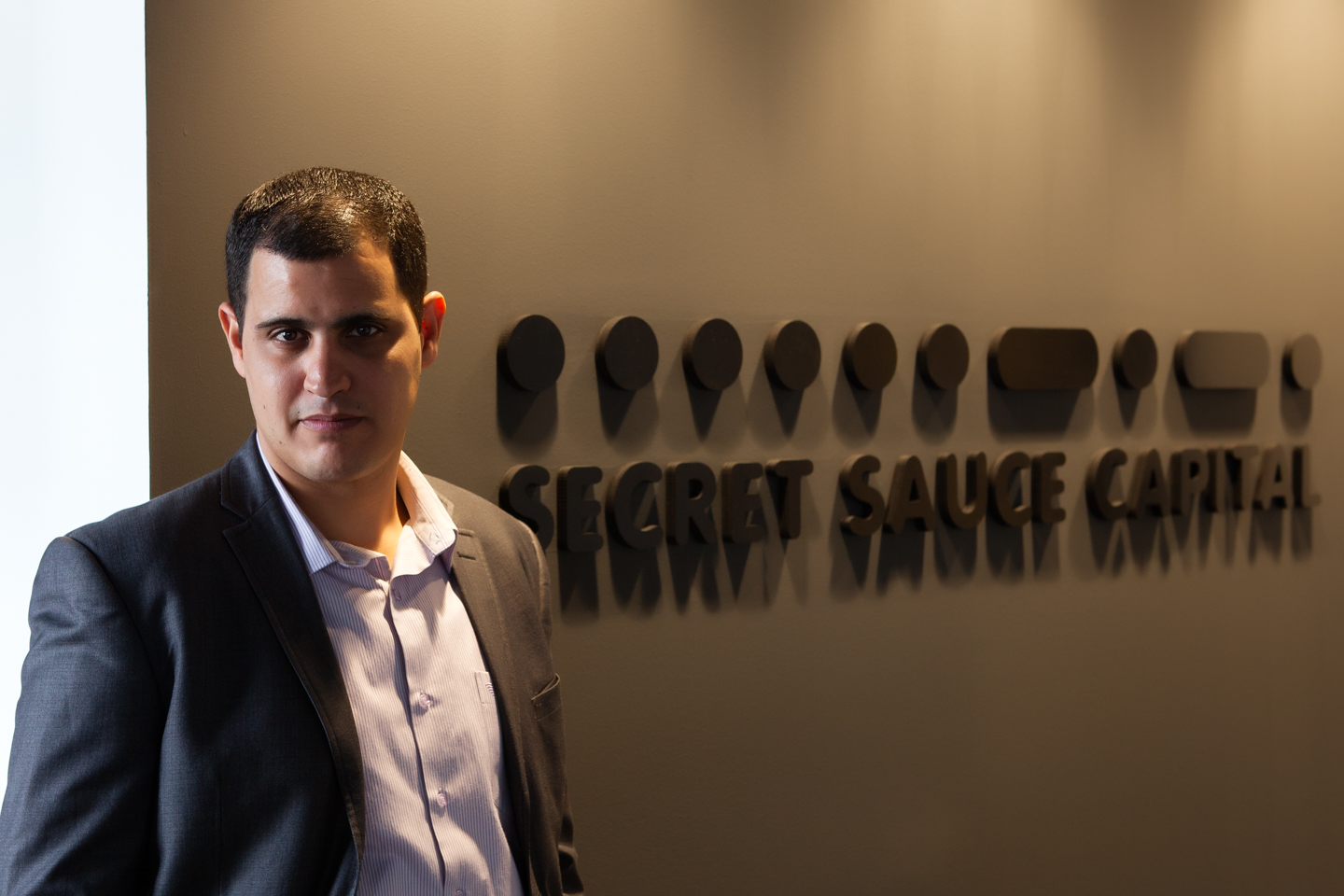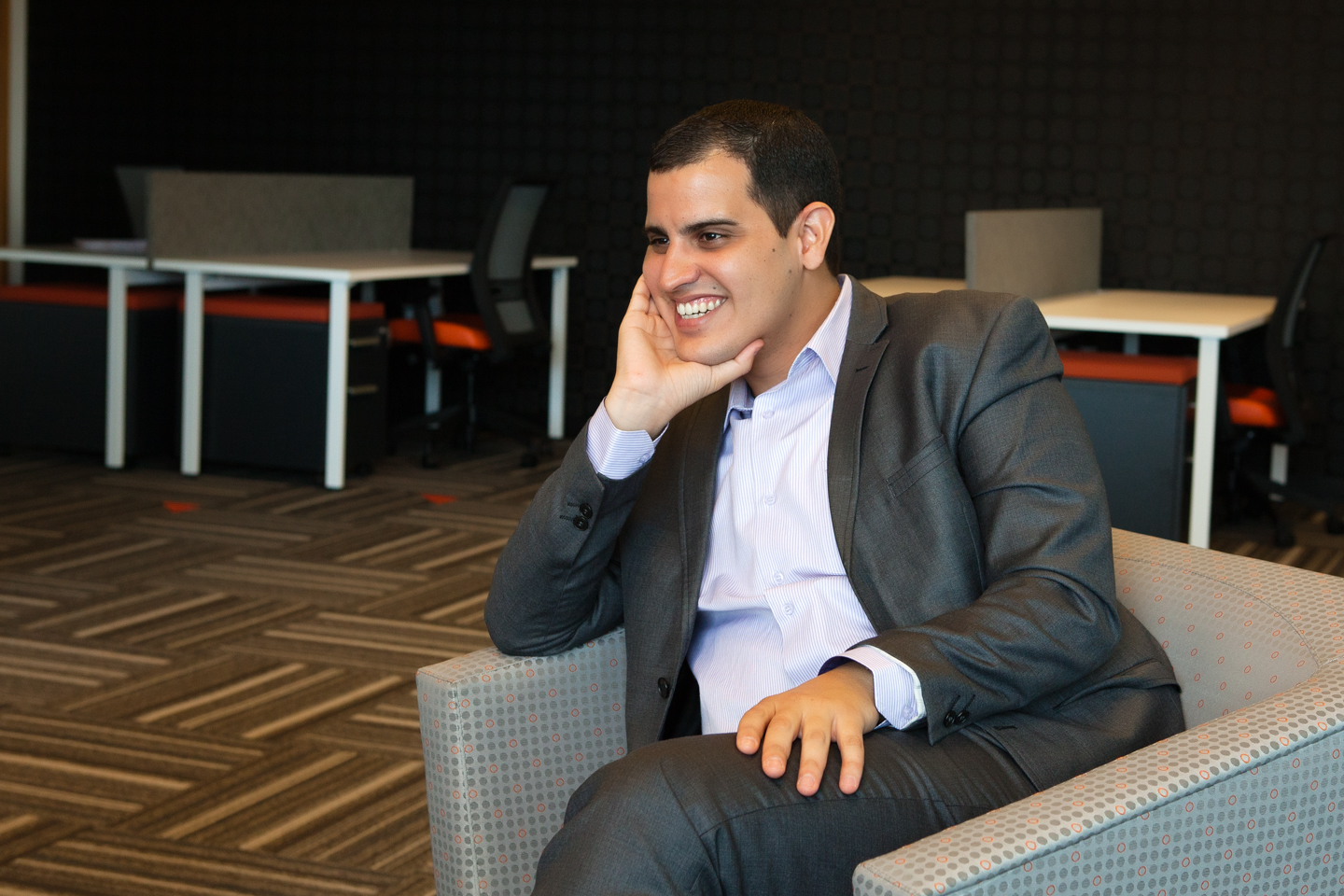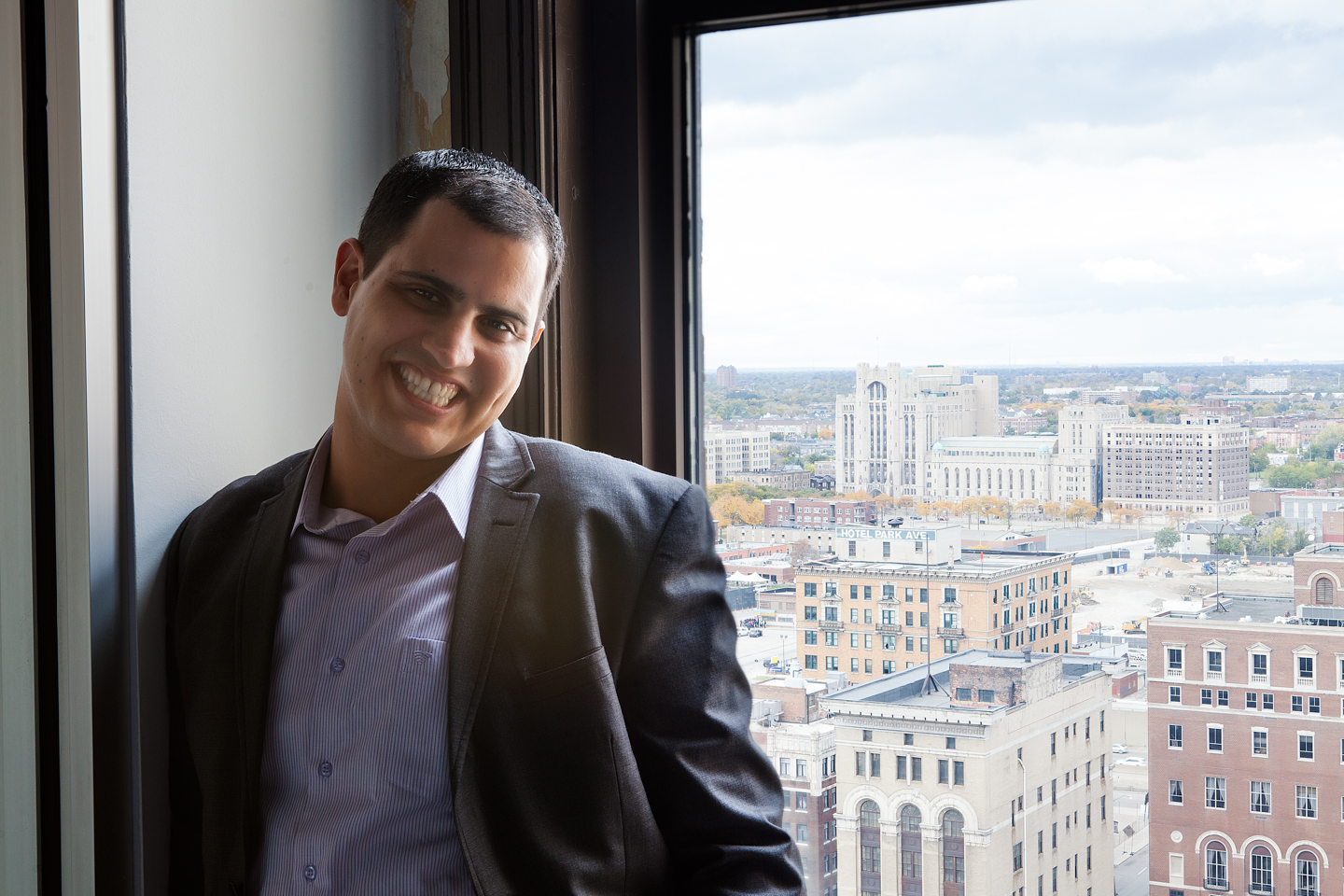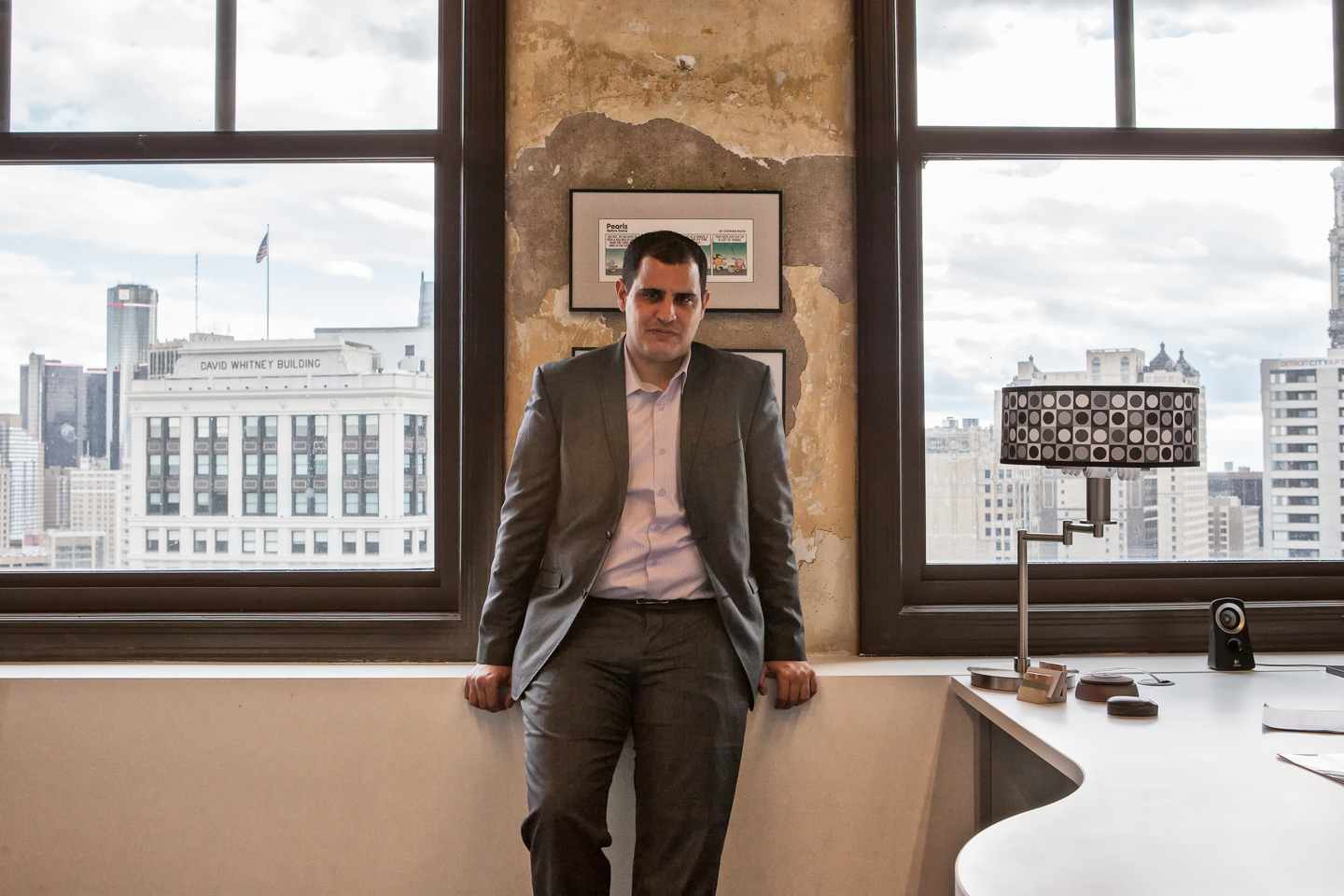An Israeli Officer & a Gentleman
By Vivian Henoch, Editor myJewishDetroit
January 4, 2016
by Vivian Henoch
From the 18th floor suite of Secret Sauce Capital at Grand Park Centre downtown, there’s a spectacular view of Detroit . . . a city building and bustling again, reclaiming its place as a business hub, wide open to opportunity. For the young and bold, for the visionary and community-minded, for today’s entrepreneurs, investors and future leaders, the city holds infinite appeal and promise. And this is where we find Shimon Levy, an Israeli entrepreneur who has adopted Detroit as his home, at least for now, for a turn at his next Big Thing.
As a Principal in Secret Sauce Capital – a new company founded by two established business leaders, Matt Lester and Robb Lippitt – Shimon is well connected in the community. Beyond his work with a growing portfolio of clients and ventures at Secret Sauce, Shimon holds a key position at Federation as a member of the executive “Advance Team.” A compelling spokesman for Israel, he is a frequent guest speaker at community events, national conferences and on college campuses.

The son of a diplomat, a Naval Captain with more than a decade of military, government and business experience in the public and private sectors, Shimon has travelled far and wide from his homeland and taken on many roles.
Spend an hour with Shimon and you get an insight in what it truly means to be Israeli in the world today. “I will say this to anyone who asks me, Israel is my home,” he says. “It’s The Israeli Way to stay as close as you can to your siblings; your family is everything. Whatever you can do to stay together, you make it happen. You haven’t necessarily got the conveniences and quality of life that you have in the U.S., and you are under constant external and internal threat, but every day you wake up grateful. You are grateful for your family and everyone who is close to you. Reality dictates that family is a very important part of your day – every day. So as much as I love my life and friends here – Israel will always be my one home.”
On “The Israeli Dream”
myJewishDetroit: Please tell us a little about your family.
I was born in Petah Tikva, about a 20-minute drive northeast of Tel Aviv. My family is still there. I’m the third of four siblings, all living no further than five minutes from our parents’ home. I have two older brothers and one younger “princess,” who has just finished her military service and recently has returned to school. I also have four nephews, ranging in age from one to four years old.
My parents share the “typical” Israeli family history for their generation. My mother was born on a ship sailing from Morocco to Israel in 1956, (the reason she was given the middle name, Jerusalem.) My father is the son of a first generation Yemenite who came to Israel as a teen orphan in 1933.
As a whole, we have lived and are still living The Israeli Dream — coming to the Promised Land to escape persecution and anti-Semitism, working and pulling together to develop the country and build a family. We are now three generations (and a fourth just starting up), still defending that Dream in spite of everything that’s happening in the world today.
In many ways, the community here has become a family extension. People have been so warm and loving and all-inclusive over the past year, inviting me out and to their homes. I could not be more grateful for those special individuals and families who have taken me in.

On Military Service
myJD: Please share a little about your military/government career and how it played (or still plays) into your educational and professional choices.
I’m still active in the reserve military, so every time I’m home in Israel, I make sure that I spend a few days back on duty. Because, like every good Israeli who has served in the military, I like to believe that in case something happens, I will be the first to be called upon. That is what we all like to believe, but of course that is rarely the truth.
My father, Eitan Levy,was a diplomat and served as the Foreign Attaché to Nepal and Australia for six years before he retired. We returned to Israel for me to finish high school. By the time I joined the military, I knew that I wanted to do something significant, something influential in my service. So I chose the Navy – where I served on active duty for more than eight years in various capacities, from an officer on a missile ship throughout the Second Lebanon War to a Squadron Commander over seven ships and my final role, as the Major Projects Director and Foreign Liaison for the Ashdod Naval base.
You know, in Israel, whether we’re in the air, on the ground or at sea, our conflict is existential, and we do whatever we can to go above and beyond. . . every escalation of the situation is something very real, very immediate and a potential threat to our home and our family. It doesn’t matter what people tell you, until you’re there to experience it first hand, it is hard to understand.
myJD: Beyond your military experience, you have an impressive academic career. How has your military service helped shape your professional direction today?
Partly, it was a matter of timing. I was fortunate to be in the first class of the Naval Academy to earn a Bachelor’s degree at the University of Haifa. Then, I went on to earn a Masters in Government – Diplomacy and Conflict Resolution at the University of Herzliya. At that point, I was doing a bunch of things simultaneously, teaching and working my way through school.
I’m a big believer in education. To me, knowledge is power. In the military, you are trained to see the world through the lenses of conflict. That’s your reality. After I finished my service, I felt the need to try to enrich myself with more information to have a multi-faceted perspective. So I joined lots of different fellowships and organizations including the Middle East 2.0 Forum, a program for young Israeli and Palestinian leaders who want to create lasting relationships and partnerships through economic development.
myJD: You then went on to Harvard, earned your Master’s in Public Policy. Why two Master’s degrees?
I would say that it is more coincidence than a plan. As I was working through applying to graduate school in the U.S., I was doing a Master’s in Israel. But for me, it also stems from the need to take risks. Dare. That’s why I’m so connected to entrepreneurism. Life is too short to not reach for the stars.
myJD: Speaking of stars, you had the distinction of representing your class as the 2014 commencement speaker. What was your message?
In a nutshell: I believe that everything is possible. “Impossible” is a myth. What’s impossible? It’s the word possible with an “im.”
On Entrepreneurism
myJD: What is your definition of an entrepreneur?
An entrepreneur is a believer, through thick and thin.
In Israel, entrepreneurism is a well-oiled machine, more of a state of mind than anything else. Most of my friends – those in my age group and particularly from the military – are all in entrepreneurial initiatives. It is a common trait.
In contrast, here in the U.S., to a large extent, entrepreneurism is still considered a daring leap of faith, a novelty not necessarily for everyone. There are risks of failure, of course. And success comes at a great personal expense. But I think entrepreneurs around the world have the same drive, same beliefs, the same confidence and process. An entrepreneur is an entrepreneur – here, in China, Japan, India, Africa – and Israel.
myJD: What “secrets” can you share about Secret Sauce Capital?
Secret Sauce Capital was founded over a year ago by Matt Lester and Robb Lippitt with the goal to invest and support entrepreneurs through a combination of strategic, operational and capital resources. Our focus is to support entrepreneurs and leverage our resources while bringing business back to Michigan as part as the growing movement to revitalize the Detroit economy.
myJD: How did you get involved with the company?
I met Matt in 2010 during one of my visits to Detroit – through my involvement with the Detroit Federation and I met Robb for the first time last year. Both Matt and Robb are huge community leaders within Federation as well as in the real estate, financial and economic sectors of Michigan. I feel very privileged and honored to be working side-by-side with them both; it is a constant process of learning and self-improvement.
On Federation
myJD: How did you get involved with the Detroit Federation?
I met Bob Aronson and Scott Kaufman back in 2009 during one of their visits to my base. They came specifically to see a Birthright evaluation program that I had started for the Navy. Up until that time, Birthright didn’t really have measures to evaluate the soldiers who joined the student tours. So we put that into place, started an organized selection process and tracking mechanisms. The program proved to be very successful.

Fast forward six years of connection, Scott invited me to come “check out Detroit” for a career move. I admit, my initial intuition was somewhat skeptical, but since I have great respect for Scott I was on the first flight out. It took a bit of digestion – and meeting incredible people such as Scott Stern and Miryam Rosenzweig – but ever since I made the decision to come to Detroit, it has been a continuous love story with the city and people. Today I can say wholeheartedly that I have a dream job here in the city and on the Federation team. I have the unique privilege of working on the nexus of business and philanthropy.
myJD: What do you tell people when they ask what’s going on in Israel?
You know, when Israel was established 67 years ago, nobody promised it would be a smooth ride. We all understood that it was going to be a struggle to build the country and more importantly, to survive. We are faced with extraordinary challenges every day, ups and downs, times that are calmer and filled with hope and times that are downright excruciating. But it’s important to keep supporting, to keep believing in the good in people in Israel, in the Diaspora and, yes, in our neighbors who surround us. And we have to act — to take actual and pragmatic steps to create a joint future for ourselves, for our children while not compromising our need for security.
In Israel optimism is not a bad word. But it takes work to understand all sides of our conflict, and you can’t do that in front of a TV screen. You have to personalize the issues, understand people – who they are, where they come from, what they do and why.
myJD: What do you consider to be Federation’s greatest challenges and opportunities?
Looking down the road, our aging population continues to be a huge challenge. On the one hand, as Scott likes to remind us, it means that our community has established deep roots, and that people are staying in place. On the other hand, we have to be prepared to meet their growing needs.
A second challenge that I notice in particular, is filling the gap between NEXTGen and those in their 40s and 50s, finding that equilibrium in our board membership, retaining and engaging that vital segment of community.
I have a bias for millennials. If I were pushed to a third challenge, I would look at the trajectory of the community within the next 10 to 15 years and ask how we can bring new talent to the city.
And if you were to ask me about Israel . . . full stop! Israel continues to challenge us all. No longer is there a consensus of opinion about how our future will unfold. There’s a growing detachment and fragmentation in the Jewish world that challenges us to give our diversity a full voice and the support we need to move forward.
On Detroit
myJD: Why Detroit, why now, why you?
Like many of my peers living downtown, I came to Detroit to be part of the movement here. It’s really something palpable. You are partaking in something bigger, where you can lead and effect change.
After nearly three years on the East Coast, living and working in Boston, not a day goes by now in Detroit where I don’t recognize what extraordinary opportunities I have for personal, professional and communal growth right here. The community is amazing.
myJD: What have been your greatest lessons so far?
Through all of my experience in the military, in government, in graduate school, I think I’ve developed the core values that shape the way I operate and interact with people . . . but I think the number one thing I’ve learned in Detroit is humility. People here have such amazing, mind-blowing experiences under their belts in the initiatives that they’ve taken, their successes, failures. . . But talk to anyone, they always speak in the most modest terms. There are no superlatives.
On the Next Big Thing
I dream of a national young Jewish Detroit conference. A three-day Shabbaton and job fair with guest speakers, workshops and tours. I envision it as a stand-alone initiative from the start. So stay tuned to “Join, Engage, Work, Interact, Connect, Hustle!”
Favorites
Restaurant: Slow’s BarBeQue They have a killer pecan pie.
Place(s) to meet for coffee: always across the street from the Federation. Convenient, close, it’s the nexus.
Building in the Detroit skyline: Of course- Grand Park Center!
Place to take kids or visitors: Henry Ford, a remarkable museum. For a walk downtown to the Eastern Market, in 20 minutes you can see the history of the city and how it’s changing now.
Places in Israel: Home! (There’s no place like my parents’ home.)
Sports: Running. My resolution is to take up golf this coming year.
Israeli Food: Spicy Moroccan fish. And shakshukah! (There is a whole culture on how you make the Israeli dish shakshukah. I am of the pepper school of thought. Fresh tomatoes, olive oil, fresh garlic, let is simmer, pepper, sugar, drop in two eggs, cover five minutes. . . done!)
Israeli Expression: Nu ve? Meaning “And, what?” In Israeli culture, if someone comes to you with a problem, you say, “Nu ve? – and what are you doing about it?” Don’t just give me a problem, give me a solution. Nu ve?
Guilty pleasures: Happy hour menus in Detroit. The best break time before going back to work!
Never leave home without: When I joined the military I was given a little prayer book Tehileem — it’s been with me ever since. For safekeeping.
Fun fact: I spent two months as a cowboy at Chisum Ranch in Texas. I started as a ranch hand, then became a personal aide to the Honorable Warren D. Chisum. It was quite an experience.
Reading now
The Success of the Storytellers by Mordechai Shatner and Ally by Michael Oren I always like to read more than one book.




